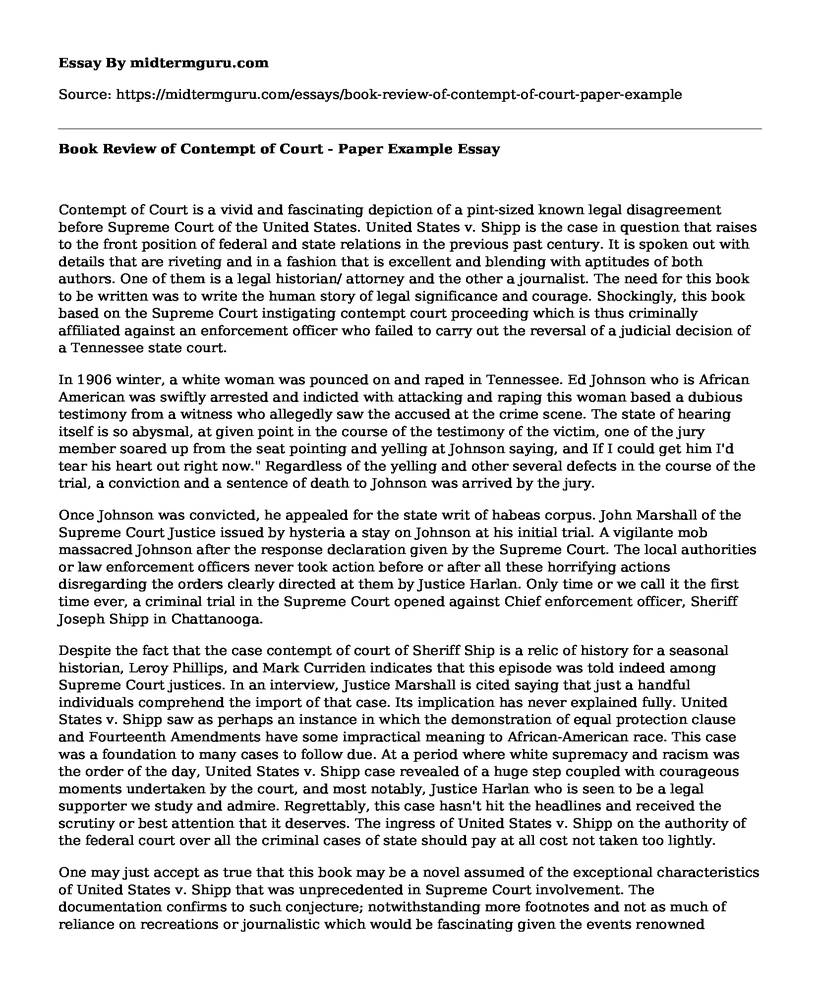Contempt of Court is a vivid and fascinating depiction of a pint-sized known legal disagreement before Supreme Court of the United States. United States v. Shipp is the case in question that raises to the front position of federal and state relations in the previous past century. It is spoken out with details that are riveting and in a fashion that is excellent and blending with aptitudes of both authors. One of them is a legal historian/ attorney and the other a journalist. The need for this book to be written was to write the human story of legal significance and courage. Shockingly, this book based on the Supreme Court instigating contempt court proceeding which is thus criminally affiliated against an enforcement officer who failed to carry out the reversal of a judicial decision of a Tennessee state court.
In 1906 winter, a white woman was pounced on and raped in Tennessee. Ed Johnson who is African American was swiftly arrested and indicted with attacking and raping this woman based a dubious testimony from a witness who allegedly saw the accused at the crime scene. The state of hearing itself is so abysmal, at given point in the course of the testimony of the victim, one of the jury member soared up from the seat pointing and yelling at Johnson saying, and If I could get him I'd tear his heart out right now." Regardless of the yelling and other several defects in the course of the trial, a conviction and a sentence of death to Johnson was arrived by the jury.
Once Johnson was convicted, he appealed for the state writ of habeas corpus. John Marshall of the Supreme Court Justice issued by hysteria a stay on Johnson at his initial trial. A vigilante mob massacred Johnson after the response declaration given by the Supreme Court. The local authorities or law enforcement officers never took action before or after all these horrifying actions disregarding the orders clearly directed at them by Justice Harlan. Only time or we call it the first time ever, a criminal trial in the Supreme Court opened against Chief enforcement officer, Sheriff Joseph Shipp in Chattanooga.
Despite the fact that the case contempt of court of Sheriff Ship is a relic of history for a seasonal historian, Leroy Phillips, and Mark Curriden indicates that this episode was told indeed among Supreme Court justices. In an interview, Justice Marshall is cited saying that just a handful individuals comprehend the import of that case. Its implication has never explained fully. United States v. Shipp saw as perhaps an instance in which the demonstration of equal protection clause and Fourteenth Amendments have some impractical meaning to African-American race. This case was a foundation to many cases to follow due. At a period where white supremacy and racism was the order of the day, United States v. Shipp case revealed of a huge step coupled with courageous moments undertaken by the court, and most notably, Justice Harlan who is seen to be a legal supporter we study and admire. Regrettably, this case hasn't hit the headlines and received the scrutiny or best attention that it deserves. The ingress of United States v. Shipp on the authority of the federal court over all the criminal cases of state should pay at all cost not taken too lightly.
One may just accept as true that this book may be a novel assumed of the exceptional characteristics of United States v. Shipp that was unprecedented in Supreme Court involvement. The documentation confirms to such conjecture; notwithstanding more footnotes and not as much of reliance on recreations or journalistic which would be fascinating given the events renowned through laborious research of the author.
Most of the books document travels of suitcases through federal and state court systems. But this book overspends its greatest deal spell on sequences and characters of events that always surround the litigation. Thus, this book isn't characterized as a story, however, is a full-blown biopic that told with amazing and detail of clarity. It evidenced as a testament researched that supplemented and underlying by complexities that surround litigation. Hence, this documented story in this book would have been more valuable to me from my perspective of selfishness that I possess if I could delve to whys and wherefores for the United States v. Shipp decisions. Therefore, no individual should make the authors culpable, nonetheless, for a beautiful narration of a narrative to be spoken.
In this book, the book lover is not familiarized to legal behavior theory nor endeavors to contend with complexities behind the court making such decisions. Thus far, this does not resemble the purpose the intent of this book thus, these authors should be left in peace for not indicating the explanation behind several arguments and decisions arrived in the court. The book splendidly reveals the significance of institutional laws of a chain of command and how such instructions can create a big difference. Thus, this book at all levels will amaze you.
Work cited
Curriden, Mark, and Leroy Phillips. Contempt of Court: The Turn-of-the-Century Lynching That Launched 100 Years of Federalism. , 1999. Print.
Cite this page
Book Review of Contempt of Court - Paper Example. (2021, May 26). Retrieved from https://midtermguru.com/essays/book-review-of-contempt-of-court-paper-example
If you are the original author of this essay and no longer wish to have it published on the midtermguru.com website, please click below to request its removal:
- Essay on Drugs and Crime
- Critical Response on Sir Gawain and the Green Knight - Literature Paper Example
- Essay on the Role and Significance of Constitutions
- The Duston Family by Nathaniel Hawthorne - Critical Essay
- Juvenile Crime Rate Paper Example
- A Comparison of Beowulf, Sir Gawain, and the Green Knight - Essay Sample
- Human Trafficking: Sex Trafficking - Essay Sample







